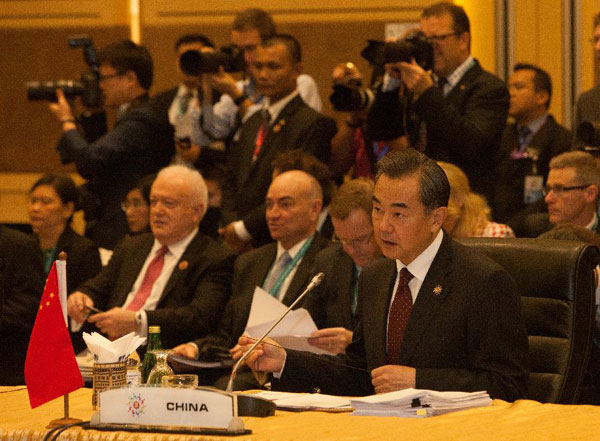Foreign Minister's view on South China Sea reasonable and clear
Updated: 2015-08-13 07:36
By Tang Qifang(China Daily)
|
||||||||
 |
|
Chinese Foreign Minister Wang Yi (R front) speaks during the East Asia Summit Foreign Ministers' Meeting in Kuala Lumpur, Malaysia, on Aug. 6, 2015. [Photo/Xinhua |
Last week, Foreign Minister Wang Yi proposed three initiatives to maintain peace and stability in the South China Sea in a speech he delivered at the China-ASEAN Foreign Ministers' Meeting in Kuala Lumpur. His speech is of great importance for all the parties involved in disputes in the South China Sea and for resolving the disputes.
For China, it is another systematic explanation of its position on the South China Sea issue. China's position on the issue is clear and consistent, and has been repeatedly emphasized by its leaders on different occasions. Wang's initiatives again present China's position in a solemn form to ASEAN member states and fully demonstrate its commitment to maintaining peace and stability in the South China Sea.
To countries around the South China Sea, the initiatives suggest an agreeable way to resolve the problems. They also present all related parties with a mechanism that can help resolve the South China Sea issue.
Based on the Declaration on the Conduct of Parties in the South China Sea (DOC) signed in 2002, the related countries around the South China Sea have initiated a series of dialogue mechanisms, including the Senior Officials' Meeting on the Implementation of DOC and the Joint Working Group Meeting on the Code of Conduct, as well as a potential meeting on precautionary measures for maritime risk management and control.
These mechanisms will be very helpful in resolving the disputes in the South China Sea. The fact that the meetings in Tianjin in late July made significant progress is self-evident that raising the issue of South China Sea disputes in detail at multilateral gatherings such as the China-ASEAN Foreign Ministers' Meeting will not be more effective.
To countries outside the region, China's position presented through the initiatives proposed by Wang makes it clear what they should do for the benefit of all. The South China Sea issue is challenging because it is complex. Other countries should encourage those in the region to settle the disputes among themselves, instead of "muddying the waters" for their selfish interests. As China has always stressed, it is against the intervention of any country that is not a party to the disputes or raising of the disputes at international or multilateral meetings.
To the international community, the proposed initiatives show the promising future of peace and stability in the South China Sea. Seeing China's commitment and sincerity, as well as the joint efforts by countries in the region to resolve the disputes, the rest of the world should rest assured about the future of the South China Sea.
Being the largest economy in the region, China depends more than any other country on the South China Sea for the passage of cargo ships, especially tankers. As a result, China also has the highest concern about the freedom and safety of navigation in the region. And that's why - more precisely, to help the vessels passing through the South China Sea - it recently built some civil facilities on some Nansha islands and reefs.
Another part of Wang's speech in Kuala Lumpur is equally remarkable, that is, the 10 new proposals to further deepen China-ASEAN cooperation. These proposals are more concrete measures to build a closer community of common destiny with ASEAN, and to push forward China-ASEAN "2+7" cooperation framework proposed by Premier Li Keqiang in 2013. More importantly, they are also crucial steps to align China's "Belt and Road Initiative" with ASEAN member states' respective development strategies.
As developing countries, China and all ASEAN members share the destiny of development. As an important part of the China-proposed 21st Century Maritime Silk Road, the South China Sea should not become a source of disputes, tensions and instability. Instead, it should act as a bond of friendship, peace and prosperity between China and ASEAN.
With the above initiatives and proposals, China has again proved its commitment and sincerity to the South China Sea issue, which should be capitalized on by the countries in the region and beyond.
The author is with China Institute of International Studies.
- Global health entering new era: WHO chief
- Brazil's planning minister steps aside after recordings revelation
- Vietnam, US adopt joint statement on advancing comprehensive partnership
- European border closures 'inhumane': UN refugee agency
- Japan's foreign minister calls A-bombings extremely regrettable
- Fukushima impact unprecedented for oceans: US expert

 Stars of Lijiang River: Elderly brothers with white beards
Stars of Lijiang River: Elderly brothers with white beards
 Wealthy Chinese children paying money to learn British manners
Wealthy Chinese children paying money to learn British manners
 Military-style wedding: Fighter jets, grooms in dashing uniforms
Military-style wedding: Fighter jets, grooms in dashing uniforms
 Striking photos around the world: May 16 - May 22
Striking photos around the world: May 16 - May 22
 Robots help elderly in nursing home in east China
Robots help elderly in nursing home in east China
 Hanging in the air: Chongqing holds rescue drill
Hanging in the air: Chongqing holds rescue drill
 2.1-ton tofu finishes in two hours in central China
2.1-ton tofu finishes in two hours in central China
 Six things you may not know about Grain Buds
Six things you may not know about Grain Buds
Most Viewed
Editor's Picks

|

|

|

|

|

|
Today's Top News
Liang avoids jail in shooting death
China's finance minister addresses ratings downgrade
Duke alumni visit Chinese Embassy
Marriott unlikely to top Anbang offer for Starwood: Observers
Chinese biopharma debuts on Nasdaq
What ends Jeb Bush's White House hopes
Investigation for Nicolas's campaign
Will US-ASEAN meeting be good for region?
US Weekly

|

|









